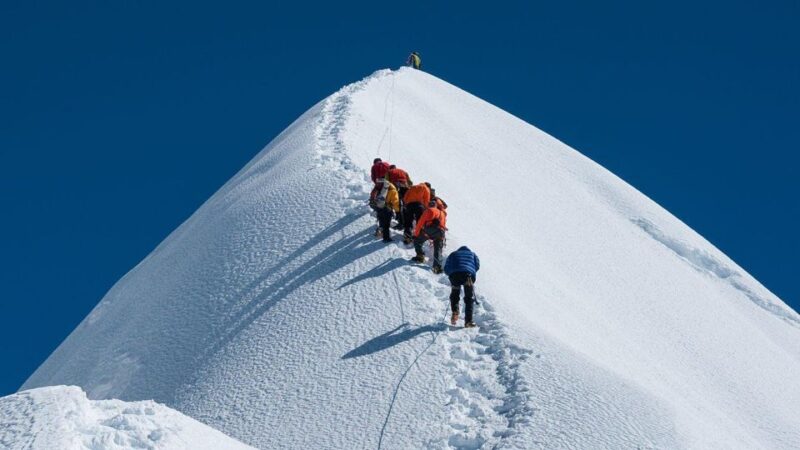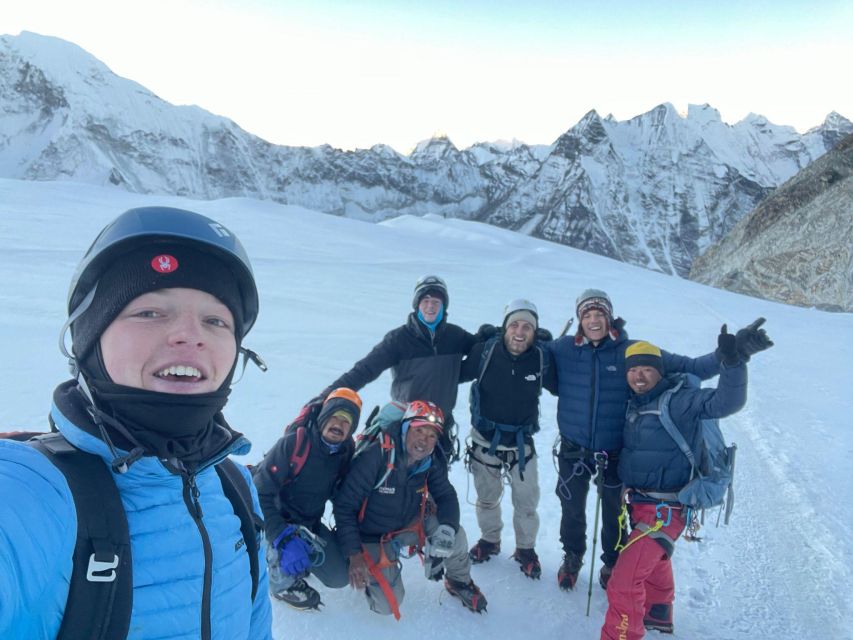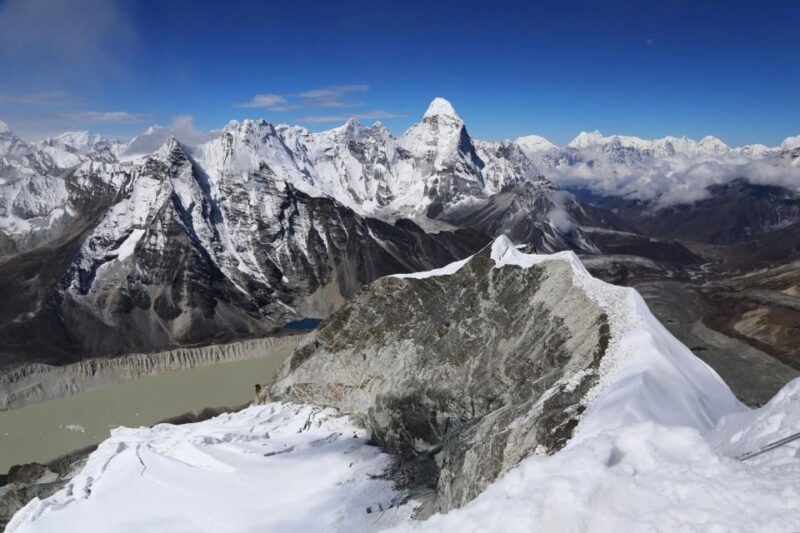Island Peak climbing presents a unique opportunity for adventurers seeking both challenge and beauty in the Himalayas. At 6,189 meters, it offers climbers a chance to experience both technical ascent and stunning views of legendary peaks like Everest and Lhotse. With a well-structured itinerary that includes acclimatization and expert guidance, it caters to those looking to push their limits while seeing rich local culture. But what makes this climb not just a test of endurance, but a transformative journey? The answer lies in the experiences that await at every turn.
Key Points

- Island Peak stands at 6,189 meters, offering an adventurous yet accessible climbing experience for various skill levels.
- The expedition lasts three days, starting from Chhukung Village, with acclimatization and climbing training included.
- Expert Sherpa guides provide safety support, climbing gear, and essential permits for a secure climbing experience.
- The best time to climb is during the pre-monsoon season, ensuring stable weather and clear views of iconic peaks.
- Participants should prepare with a fitness regimen, quality gear, and familiarity with basic climbing techniques to enhance safety and enjoyment.
Island Peak Overview

Island Peak, also known as Imja Tse, is a captivating trekking peak in Nepal that attracts adventurers with its stunning views and challenging ascent. Standing at 6,189 meters, it offers a unique blend of accessibility and adventure.
The climbing experience is designed for those looking to push their limits, making it a popular choice among trekkers. With a starting price of $1,006.56 per person, groups are limited to 10 participants, ensuring a personalized journey.
A live tour guide fluent in English provides invaluable support throughout the trek. The expedition lasts three days, providing ample time to acclimatize and explore the breathtaking landscapes.
Plus, free cancellation up to 24 hours in advance adds flexibility for travelers planning their adventure.
You can also read our reviews of more tours and experiences in Koshi Zone.
Climbing Experience

Reaching the summit of Island Peak at 6,189 meters offers climbers a thrilling blend of technical challenges and breathtaking views. The ascent includes steep sections where fixed ropes become essential, ensuring safety as climbers navigate the rugged terrain. Participants experience a unique glacial adventure while crossing the Imja Glacier and negotiating crevasses, honing their skills along the way.
Once at the top, climbers are rewarded with panoramic vistas of majestic peaks, including Lhotse, Makalu, Ama Dablam, and the iconic Mount Everest. This climb not only tests their physical endurance but also ignites a deep appreciation for the stunning Himalayan landscape.
With expert guidance, climbers find the experience both exhilarating and unforgettable, making it a highlight of their trekking journey.
Cultural Insights
Climbers not only face the challenges of reaching the summit but also enjoy the rich culture of the Sherpa communities nestled in the Khumbu region.
As they trek through vibrant villages, they witness age-old traditions, hear stories of resilience, and experience the warmth of Sherpa hospitality.
Stopping by local monasteries, climbers gain insights into Buddhist practices and the spiritual significance of the mountains. They might even participate in cultural rituals, deepening their connection to this stunning landscape.
The lush Sagarmatha National Park, a UNESCO World Heritage site, adds to the experience, with its unique flora and fauna.
This culture makes Island Peak climbing not just a physical journey but also a profound exploration of the Sherpa way of life.
Itinerary Details
What adventures await over the course of three days on the Island Peak climbing itinerary?
On Day 01, climbers arrive in Chhukung Village, where they’ll settle in and soak up the stunning surroundings.
Day 02 kicks off with an early morning trek to Island Peak Base Camp, where participants engage in essential climbing training. They’ll prepare for the ascent while enjoying the breathtaking views.
Finally, Day 03 is the highlight: climbers tackle Island Peak itself. The climb takes about 8 to 9 hours, offering exhilarating challenges and magnificent panoramas. After reaching the summit, adventurers descend back to Chhukung, relishing their accomplishments and the high-altitude experience.
Each day unfolds a perfect blend of excitement and natural beauty.
More Great Tours NearbyEssential Inclusions
Island Peak climbing includes a comprehensive package that ensures adventurers have everything they need for a safe and memorable experience. This well-structured itinerary features essential inclusions that cover all aspects of the journey, making it accessible for climbers of various skill levels.
Here are three key components:
-
Professional Guidance: A Sherpa mountaineering guide provides expert knowledge and support throughout the climb, ensuring safety and assistance.
-
Climbing Gear: Essential equipment, including ropes and ice axes, is provided, allowing climbers to focus on their ascent without worrying about gear.
-
Permits and Insurance: The package includes necessary climbing permits and travel insurance, so participants can embark on their adventure with peace of mind.
With these inclusions, climbers can fully enjoy the breathtaking experience that Island Peak offers.
Safety Measures
Ensuring safety during the Island Peak climbing adventure involves a combination of expert guidance, proper training, and the use of essential gear.
Experienced Sherpa guides play a crucial role, providing insights on the route and monitoring climbers’ health. Prior to the ascent, participants undergo thorough training, focusing on essential climbing techniques and safety protocols, which builds confidence and competence.
The right gear is vital; climbers should use helmets, harnesses, and crampons to navigate the challenging terrain safely. Plus, acclimatization days are built into the itinerary, reducing the risk of altitude sickness.
Best Time to Climb
The best time to tackle the climb is during the pre-monsoon season from late April to early June, when the weather conditions are generally stable and the views are at their most breathtaking. Climbers can expect clear skies and pleasant temperatures, making for an enjoyable experience.
Here are three key reasons to consider this timeframe:
-
Optimal Weather: Fewer chances of snow and rain enhance climbing conditions.
-
Stunning Views: Unobstructed vistas of iconic peaks like Everest and Lhotse are guaranteed.
-
Favorable Climbing Conditions: Stable snow and ice conditions make the ascent safer and more manageable.
Choosing this season maximizes the adventure, ensuring a memorable experience on Island Peak.
Preparation Tips
Preparing for the climb to Island Peak requires careful planning and training to ensure a safe and enjoyable experience.
Climbers should start with a fitness regimen focusing on endurance, strength, and flexibility, ideally three months before the trip. Acclimatization is crucial, so practicing at higher altitudes will help prepare the body.
It’s essential to invest in quality gear, including a proper sleeping bag, climbing harness, and waterproof clothing, as conditions can be unpredictable.
Plus, participants should familiarize themselves with basic climbing techniques, especially for navigating fixed ropes and glacier travel.
Frequently Asked Questions
What Fitness Level Is Required for Island Peak Climbing?
To tackle such a climb, participants need a good fitness level. They should’ve prior hiking experience, be comfortable with altitude, and maintain stamina for long days, ensuring they can handle physical challenges along the way.
Are There Age Restrictions for Participants on the Climb?
Age restrictions for participants typically exist in climbing activities. Most companies set a minimum age of 16, while some may allow younger climbers with parental consent. It’s essential to check specific guidelines before booking.
What Kind of Food Is Provided During the Expedition?
During the expedition, participants enjoy a variety of nutritious meals, including local dishes. The guides ensure everyone’s dietary needs are met, providing energy-rich food to support their challenging journey and maintain morale throughout the climb.
Is Altitude Sickness a Concern, and How Is It Managed?
Altitude sickness is a real concern during high climbs. To manage it, guides monitor symptoms closely, encourage gradual acclimatization, and provide supplemental oxygen if necessary, ensuring everyone stays safe and enjoys the climb.
Can I Hire Personal Equipment Instead of Bringing My Own?
He can hire personal equipment instead of bringing his own. Rental services usually offer a range of climbing gear, ensuring he has everything necessary for a safe and enjoyable experience without the hassle of transporting bulky items.
Recap
To sum it up, Island Peak climbing offers a unique blend of adventure and culture, making it a must-try for any trekking enthusiast.
With expert guidance, a supportive Sherpa team, and breathtaking views, climbers can conquer the summit while experiencing the rich heritage of the Himalayas.
Whether you’re seeking physical challenges or unforgettable memories, this expedition promises an enriching journey that’s sure to inspire.
So, gear up and get ready for an unforgettable adventure in the heart of the mountains!
You can check availability for your dates here:More Tour Reviews in Koshi Zone
Not for you? Here's more nearby things to do in Koshi Zone we have reviewed
- Kathmandu- 1:Hour Mount Everest Flight with Private Transfer
- Gokyo Valley Circuit Trek 13 Days
- Mountain Flight by Buddha Air with Free Transfers
- Everest Expedition 2025/2026
- 4 Best Tours In Koshi Zone
- 9 Best Treks And Hiking Tours In Koshi Zone
- 4 Best Helicopter Flights And Tours In Koshi Zone
- Everest Flight – A Journey Above the Himalayas
- Experience Everest: 1-Hour Scenic Flight Above the Himalayas
- From Kathmandu : Pikey Peak 5 Days Trek
- From Kathmandu: Pikey Peak Trek
- Kathmandu Everest Helicopter Tour With Guranteed Landing
